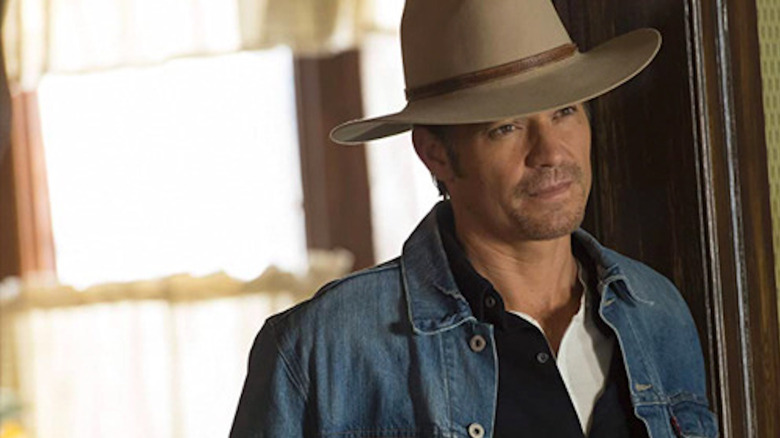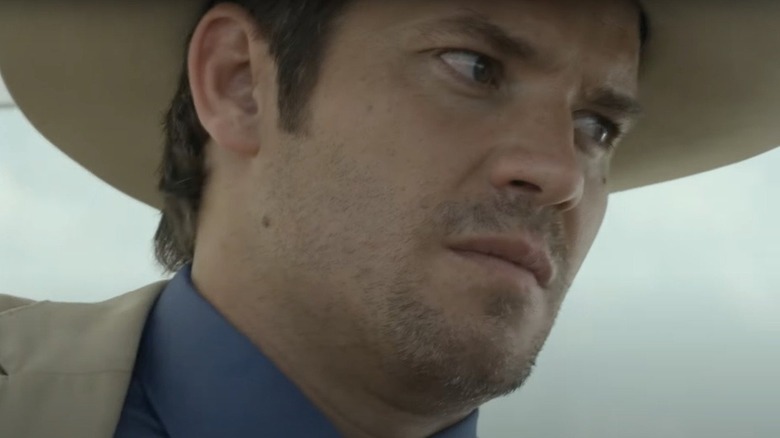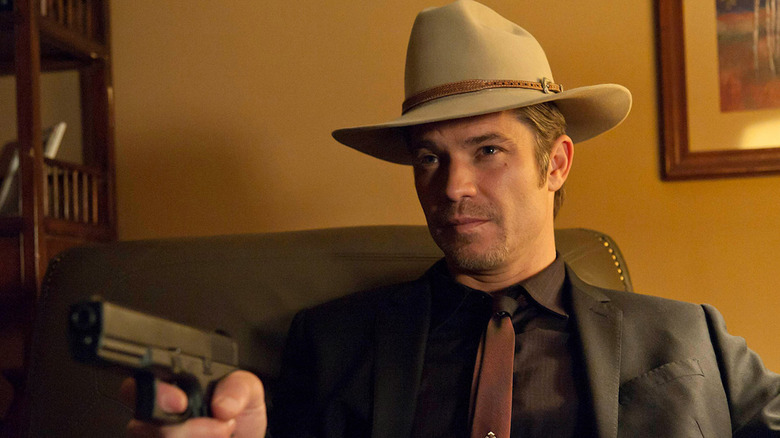Justified: City Primeval Hopes To 'Get It Right' With Its Depiction Of Law Enforcement
When FX's "Justified" completed its six-season run in 2015, the United States' view of law enforcement was undergoing a radical shift due to the unrest in Ferguson, Missouri over police officer Darren Wilson's fatal shooting of unarmed 18-year-old Michael Brown. There would be many more tragic incidents in the years ahead, but the most egregious might've been the murder of George Floyd by Minneapolis policeman Derek Chauvin. Fortunately, justice was served in this case (Chauvin is currently serving a 21-year prison bid), but Chauvin's nearly 10-minute choking of Floyd was so mind-bogglingly cruel that anything less than a life sentence felt inadequate.
As these abuses piled up, and the dynamic between cops and the people they're charged to protect and serve changed, people began pointing to the propensity of films and television to valorize law enforcement and the judicial system as upstanding dispensers of justice. And if you happen to find a loose cannon in the mix (e.g. Dirty Harry, Martin Riggs or John McClane), just know their extrajudicial methods are a product of what Clint Eastwood once called "a higher morality." The only thing they're guilty of is caring too much.
While long-running shows like "Law & Order" grapple with their role in presenting an idealized portrait of law enforcement, United States Deputy Marshal Raylan Givens (Timothy Olyphant) is returning to our living rooms in "Justified: City Primeval." This eight-episode miniseries transplants the unorthodox gunslinger from his home turf of Kentucky to Detroit, where he joins the local police in trying to take down an unrepentant murderer known as "The Oklahoma Wildman" (Boyd Holbrook). Though "Justified" portrayed Givens as a flawed lawman with a troubling, trigger-happy reputation, we still rooted for him through all six seasons. This time out, the "Justified" team knows they have to address the hulking elephant in the room, and, as they explained during their Television Critics Association panel yesterday, they're tackling it head-on.
How to portray a changing world without preaching
/Film's Vanessa Armstrong was in attendance when Olyphant was asked about a courtroom interrogation scene in the first episode, which finds Givens having to answer some tough questions about his handling of a Black suspect. Olyphant credited miniseries co-developer Michael Dinner with "putting Raylan on the stand" early on. Per the star:
"I thought it was a great idea. My wife loves 'Law & Order.' Perhaps I love 'Law & Order.' But we're not that. We're not a show that just cheerleads for law enforcement. I'd like to think part of what makes Elmore Leonard's world something different is... the lead characters are self-aware a little bit. They're aware of their flaws and they're aware of their shortcomings and they're aware that it's complicated."
Dinner jumped in to clarify that, while the miniseries will depict how Raylan is adapting to a "changing world," it's not going to get preachy:
"I think it's inherent in the material, in the eight episodes of the story. We didn't do a show about ideas, we did a show that's emotional. We're not beating the drum, but it's certainly front and center. The world has changed and Raylan has changed. So certainly it's an issue, but we're not putting it so front and center that it becomes a diatribe."
Will Raylan Givens gunslinger act play in Detroit?
That's a relief. One of the most enjoyable aspects of the original "Justified" series was its Elmore Leonard-inspired affinity for all its colorful characters, good or just plain evil. The author's best work is brisk and bursting with spiky dialogue, and, as we saw with the rivalry between Givens and Boyd Crowder (Walton Goggins), there isn't a great deal of difference between the cops and the criminals.
According to executive producer Sarah Timberman, "Justified: City Primeval" will allow Givens a glimpse into how his professional life could be different if he fully succumbed to corruption. "There's a scene further in the show where Raylan confronts almost a Ghost of Christmas Future character of what it would be like to be a law enforcement person who sleeps easy at night and crosses lines."
Of the peak television era, "Justified" is one of the few shows that knew when to call it quits. But that only applies to the Givens-Crowder saga. Leonard loved to place his characters in different situations, and, to that end, the Motor City is most certainly not Kentucky. Seven years was just long enough to get us missing Raylan. With this superb creative team, I can't think of a more fascinating character through whom to examine the current state of law enforcement and America in general.


